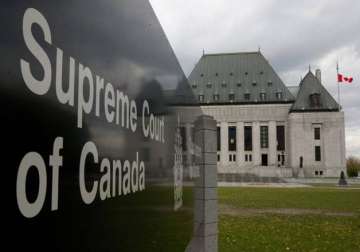New Delhi: The Supreme Court of Canada on Friday turned down the decision of Mercy Killing which was earlier banned in 1993. After the court's ruling, Canada is now in the company of the western countries where this practice is legal.
The apex court said it would be allowed in the case of consenting adults who are suffering intolerably from a severe and incurable medical condition, whether physical or psychological, and the illness does not have to be terminal. The decision takes effect in 12 months.
The court in its statement disagrees with the absoulute prohibition on assistance in dying or that individuals cannot waive their right to life.
The decision came after two women with debilitating illnesses lose their lives.
Gloria Taylor who was an advocate of medically-assisted dying and suffered from Amyotrophic Lateral Sclerosis (ALS), filed the right to die lawsuit in April 2011 died of her illness in 2012 after her a neurologist diagnosed her with the disease in 2009.
The family of a second woman and activist, Kay Carter, eventually travelled secretly to Switzerland with her daughter Lee, where she was able to legally end her own life with medical assistance, on her own terms.
Lee, who spent the last years of her life fighting for the right to die with dignity, said her mother would have been relieved at a historic ruling Friday by the Supreme Court.
The Court majority was a narrow 5-4 in the 1993 decision. The sole judge left on the court from that time is Beverley McLachlin, now chief justice, and she was in the dissent last time.
"This is one incredible day," said Grace Pastine, litigation director of B C Civil Liberties Association, which initiated the challenge.
"Physician-assisted dying is now recognized for what it is: a medical service that brings an end, for some individuals, to unbearable suffering."
Though the decision can be again overturned by the Canadian Parliament but that is very unlikely to happen. Parliamentarians are heading into a federal election in October and thus will have a year to implement a regulatory framework.
The house has previously rejected several attempts to legalize physician-assisted suicide through bills brought by its members.
Religious groups and organizations representing disabled people had opposed any relaxation of the ban, arguing that this would make them vulnerable to being killed.
However some members of parliament argued that they should have the choice. There does need to be some criminal code provision.
Since 1993 pressure for assisted suicide has persisted. Last year the Quebec government introduced a bill to legalize it, arguing this was a matter of healthcare under provincial jurisdiction, not a criminal matter in the federal bailiwick.
Latest World News

